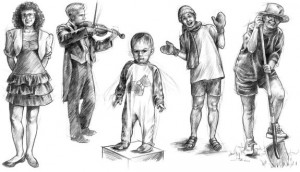Guest editor for the special issue: Oana Mateescu, University of Michigan, omateesc@umich.edu
Extended deadline for manuscript submission: 20 February 2012
Send articles, research notes and book reviews to:
compaso@compaso.eu
In the early 19th century, Johann Pestalozzi introduced object lessons to encourage children to learn from direct experience, in a progression of touch, story and abstraction. His telling objects have been gradually replaced or insistently accompanied by photos, stories and theories: objects are recalcitrant and do not stick to authorized interpretations, they do not always give pupils the proper stories. Truth be told, objects are often dangerous – but also seductive, affording effective action, play and intimate knowledge.

The Journal of Comparative Research in Anthropology and Sociology – Compaso invites articles attending to special objects and their distinctive work in social interaction, with a focus on learning and knowledge creation.
After a period of low profiling, objects in social research have gradually recovered their everyday life significance (Preda, 1999; Turkle, 2007). Objects are found in many places and spaces (Law & Singleton, 2005) when inquiring into world-and-knowledge-in-the-making. They may bear plain names in unorthodox theoretical stories, for instance (from A to D) anaemia, anthrax, alcoholic liver disease, canoe head, computer, denim, diabetes, door hinge, or Doppler apparatus. Some are special objects marked as such by dedicated names. Novel concepts point to their unfamiliar ontology or work. The much discussed immutable mobiles (Latour, 1986) and boundary objects (Akkerman & Bakker, 2011; Bowker & Star, 1999; Star, 2010; Star & Griesemer, 1989; Trompette & Vinck, 2009), fluid objects (Mol & Law, 1994), fire objects (Law & Singleton, 2005), affiliative objects (Suchman, 2005), or epistemic objects (Knorr Cetina, 2001; Rheinberger, 1997) are some of the notions that challenge previous theoretical threads as well as one another. Theorized objects thus become increasingly interlinked in research accounts – while also multiplying independently. All in all, a small army of objects scaffold knowledgeability (Orlikowski, 2006) and perform competing and heterogeneous realities (Law, 2010).
We invite contributions that guide reflection on objects-good-to-think-with (Turkle, 2010; 2008), including – but not limited to – the following topics:
- Materiality of knowledge: the mutual constitution of objects and knowledge;
- Temporal structures of objects and knowledge, and the materiality of time;
- Boundary objects in learning and knowledge creation;
- Objects in distributed cognition: aggregating knowledge in groups, environments and across time;
- Affordances: how objects invite actions and knowledge by virtue of their sensory structures, inscriptions, aesthetics, and other features that orient action;
- Objects that fade into invisibility and objects that rise to prominence: experiencing objects from the ordinary to the remarkable;
- Observability of objects and their workings, in social research.
Articles that engage in a comparative approach, connecting different concepts, materials, methods, situations, pieces of research or other social realities, are particularly welcome. Please check the Journal’s website for guidelines on manuscript submission: http://compaso.ro/instructions-for-authors/
References
Akkerman, S. F., & Bakker, A. (2011). Boundary Crossing and Boundary Objects. Review of Educational Research, 81(2), 132-169.
Bowker, G. C., & Star, S. L. (1999). Sorting Things Out: Classification and Its Consequences. New Baskerville: MIT Press.
Knorr Cetina, K. (2001). Objectual practice. In T. R. Schatzki, K. Knorr Cetina, & E. von Savigny (Eds.), The Practice Turn in Contemporary Theory (pp. 184-197). London: Routledge.
Latour, B. (1986). Visualization and Cognition: Thinking with Eyes and Hands. Knowledge and Society: Studies in the Sociology of Culture Past and Present, 6, 1-40.
Law, J. (2010). Reality Failures. Retrieved August 28, 2011, from http://heterogeneities.net/publications/Law2010RealityFailures5.pdf.
Law, J., & Singleton, V. (2005). Object Lessons. Organization, 12(3), 331-355.
Mol, A., & Law, J. (1994). Regions, Networks and Fluids: Anaemia and Social Topology. Social Studies of Science, 24(4), 641-671.
Orlikowski, W. J. (2006). Material knowing: the scaffolding of human knowledgeability. European Journal of Information Systems, 15(5), 460-466. Nature Publishing Group.
Preda, A. (1999). The Turn to Things: Arguments for a Sociological Theory of Things. The Sociological Quarterly, 40(2), 347-366. doi: 10.1111/j.1533-8525.1999.tb00552.x.
Rheinberger, H.-J. (1997). Toward a history of epistemic things: synthesizing proteins in the test tube. Stanford: Stanford University Press.
Star, S. L. (2010). This is Not a Boundary Object: Reflections on the Origin of a Concept. Science, Technology & Human Values, 35(5), 601-617.
Star, S. L., & Griesemer, J. R. (1989). Institutional Ecology, `Translationsʼ and Boundary Objects: Amateurs and Professionals in Berkeley’s Museum of Vertebrate Zoology, 1907-39. Social Studies of Science, 19(3), 387-420.
Suchman, L. (2005). Affiliative Objects. Organization, 12(3), 379-399.
Trompette, P., & Vinck, D. (2009). Revisiting the notion of Boundary Object. Revue dʼanthropologie des connaissances, Vol. 3(1), 3-25. S.A.C.
Turkle, S. (2010). Object Lessons. In M. M. Suárez-Orozco & C. Sattin-Bajaj (Eds.), Educating the Whole Child for the Whole World (pp. 109-123). New York: New York University Press.
Turkle, S. (Ed.). (2007). Evocative Objects: Things to Think With. Cambridge, MA: MIT Press.
Turkle, S. (Ed.). (2008). Falling for Science. Objects in Mind. Cambridge, MA: The MIT Press.



